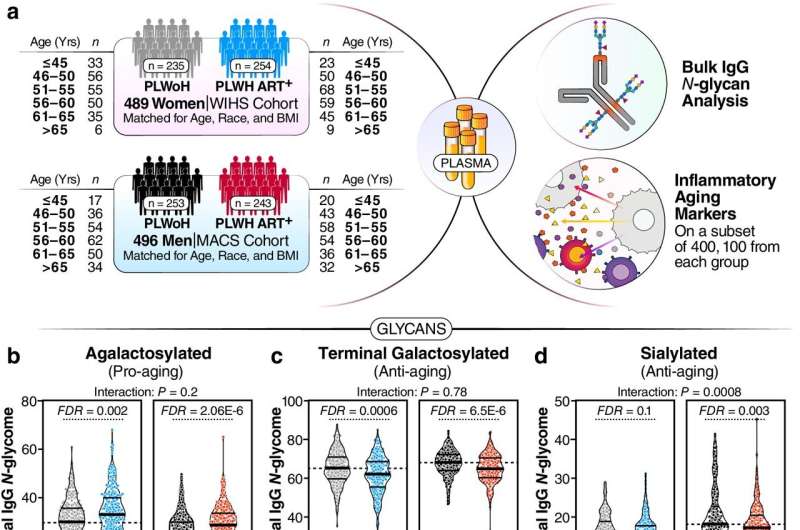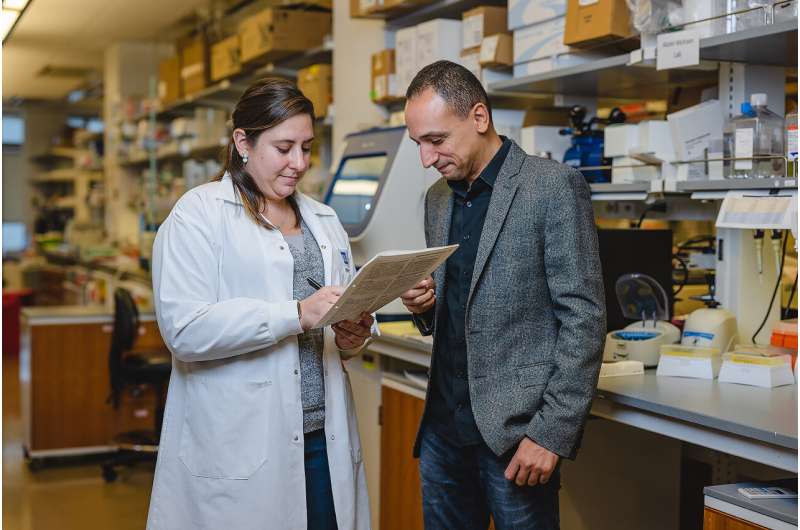This article has been reviewed according to Science X's editorial process and policies. Editors have highlighted the following attributes while ensuring the content's credibility:
fact-checked
peer-reviewed publication
trusted source
proofread
Scientists identify pro-aging 'sugar signature' in the blood of people living with HIV

The Wistar Institute's associate professor Mohamed Abdel-Mohsen, Ph.D., along with his team and collaborators, has identified sugar abnormalities in the blood that may promote biological aging and inflammation in people living with HIV (PLWH). The findings, taken from a large data study comprising more than 1,200 participants, are detailed in the new paper, "Immunoglobulin G N-glycan Markers of Accelerated Biological Aging During Chronic HIV Infection," published in the journal Nature Communications.
Despite advances in HIV treatment, notably the success of antiretroviral therapy (ART) in suppressing the virus to undetectable levels, HIV remains incurable, with the virus persisting in a dormant state within the body. This chronic presence is linked to long-term health issues, including persistent inflammation and a higher prevalence of aging-related diseases such as cancer and neurocognitive disorders. These conditions tend to occur more frequently and at an earlier age in PLWH compared to the general population.
Abdel-Mohsen seeks to understand how chronic viral infection causes this accelerated biological aging, which refers to the body aging faster than one's chronological years would typically indicate. By understanding the molecular mechanisms behind accelerated biological aging in people living with chronic viral infections, scientists can begin to formulate strategies to mitigate the negative effects.
While many factors in the body can contribute to accelerated biological aging, researchers focused on a novel factor: abnormalities of the human glycome—the totality of the various sugar structures circulating throughout the body.
Previous studies have established a connection between aging and shifts in the glycan composition of immunoglobulins (IgGs), which are critical for immune regulation. As people age, their IgGs lose anti-inflammatory properties and gain pro-inflammatory characteristics.
Abdel-Mohsen's research investigates whether living with a chronic viral infection, such as HIV infection, exacerbates these changes, leading to premature aging and related diseases.

By comparing glycan profiles in more than 1,200 individuals, both with and without HIV, the team discovered that PLWH exhibit elevated levels of inflammatory and pro-aging IgG glycan signatures.
In a remarkable step forward, the team developed a machine-learning model that uses these glycan signatures to estimate the biological age of PLWH and assess the rate of aging acceleration. This glycan signature also has the potential to predict the onset of comorbid conditions in PLWH, such as cancer, years in advance.
To confirm that these glycan-associated disruptions were causal rather than merely correlative, the research team engineered HIV-specific antibodies designed to exhibit the same kind of aberrant IgG glycan modifications observed in PLWH.
Testing these glycoengineered antibodies in vitro confirmed that the modified antibodies were less effective at mounting an immune response than their unmodified counterparts, suggesting that these sugar abnormalities might directly contribute to the worse clinical outcomes observed.
Importantly, when they designed these antibodies to have glycans similar to those found in biologically younger individuals, these antibodies demonstrated a remarkable ability to enhance the immune system's ability to fight virus-infected cells.
"Utilizing glycan signatures to predict early onset of diseases in people living with HIV marks a pivotal shift towards proactive health care," said Abdel-Mohsen.
"This could significantly alter clinical outcomes, allowing for timely interventions and personalized treatment plans. The impact on treatment and management in the HIV community could be revolutionary. Beyond biomarkers, antibodies glycoengineered to mimic biologically younger glycans offer a new therapeutic avenue. This method could enhance immune responses, paving the way for innovative treatments."
More information: Immunoglobulin G N-glycan Markers of Accelerated Biological Aging During Chronic HIV Infection, Nature Communications (2024). DOI: 10.1038/s41467-024-47279-4





















